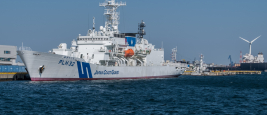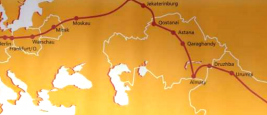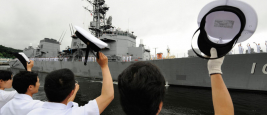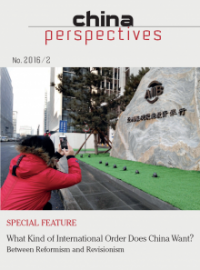More than three years have already passed since China’s new silk roads were launched by President Xi Jinping. When he first mentioned the idea in an autumn 2013 speech in Kazakhstan, questions quickly emerged on the meaning of this general concept, which soon became widely promoted through a...

Asia

Asia is now a nerve center for global economic activity and a theatre of some of the most critical political and security developments of our time. The Center for Asian Studies provides documented expertise and a platform of discussion on Asian issues that seeks to accompany decision makers and explain and contextualize developments in the region for the sake of a larger public dialogue.
Ifri's Center for Asian Studies’ research is organized along three major axes: regionalism and intra-regional relationships in Asia; relations between Asia’s major powers (China, Japan, India) and the rest of the world; and internal political, economic and social dynamics of Asian countries. This research focuses primarily on China, India and Japan, but also increasingly covers the Korean peninsula, Southeast Asia, the Pacific Islands and the Indo-Pacific Strategies.
The Center organizes closed-door roundtables, expert-level seminars and a number of public events, including an Annual Conference, that welcome experts from Asia, Europe and the United States. The Center’s researchers regularly participate in international conferences, particularly in Asia. Their work, as well as that of their partners, is regularly published in the Center’s electronic journal Asie.Visions.
Research Fellow, Head of Japan Research, Coordinator of the Program on Pacific Islands,
...
Research Fellow, Center for Asian Studies
...Advisor to the Program on Pacific Islands, Center for Asian Studies
...Senior Advisor, Center for Asian Studies
...Associate Research Fellow, Center for Asian Studies
...Despite being geographically distant, France and Japan share a number of converging interests.
This essay examines the need for growing coordination between the Japan Coast Guard (JCG) and the Japan Maritime Self-Defense Force (JMSDF) to better cope with gray-zone situations.
Southeast Asia is one of the world's most dynamic regions and experiences strong economic and energy demand growth rates. In this context, the Association of Southeast Asian Nations (ASEAN) is seeking to interconnect the electric grids and gas networks of the countries...
As China elaborates on the design of its "Belt and Road Initiative" (OBOR), the place of Europe within this project is slowly but surely taking shape.
This paper analyses the causes and consequences of the 2016 uprising in Kashmir, making six interrelated arguments.
Chinese presence in the Mediterranean is increasing: propositions for cooperation forums with various southern European countries, investment in port terminals, military maneuvering, evacuation of citizens, etc.
Coping with “gray zone” situations has in recent years become the core security challenge for Japan. Since September 2012, Beijing has been challenging Japan’s sovereign control of the Senkaku Islands by regularly sending law-enforcement vessels into Japanese territorial waters and...
Having long remained a passive presence within multilateral economic organisations, China recently changed its stance when the United States was faced with a major financial crisis.
The reason for the deployment of a People’s Liberation Army Navy (PLAN) “anti-piracy task force” in the Gulf of Aden (GoA), a key area for the Chinese economy, was obvious in 2008. However, as the pirate activity has faded away since 2012, the objectives of the PLAN in GoA became unclear. ...
The Rise of Superpowers: Friction and Cooperation in Japan's Relations with the Emerging Asian Superpowers
A conference with Yukio Okamoto, former Advisor for Foreign Policy of Japanese Prime Minister Koizumi. This discussion will be held in English.
Pakistan: Anchor for Peace and Stability in the Region
A conference by Khurshid Kasuri, Foreign Minister of Pakistan, chaired by Thierry de Montbrial, President, Ifri.
India - The New Economic Paradigm
A conference by Kamal Nath, Indian Minister of Commerce and Industry, presided by Dominique Moïsi, Special Advisor, Ifri. (In English) (For corporate members)
Growth and Trade Prospects in Asia
A conference co-organised by the Asian Development Bank (ADB), the Agence Française de Développement (AFD) and the Centre asie ifri on the occasion of the publication of the last report of the ADB 'Asian Development Outlook 2006'....
Sur le marché des terres rares, dont le chiffre d'affaires annuel avoisine 4 milliards de dollars (3,2 milliards d'euros), pour une production de 130 000 tonnes, la Chine détient aujourd'hui un quasi-monopole. Ces matériaux sont cruciaux pour les secteurs de pointe,...
Alors que le sommet des Nations Unies « Rio+20 » s’achève, nous allons nous intéresser ce matin à la place de la Chine dans ces négociations et plus généralement à sa position quant à la question environnementale.
...Face à l'envolée des prix et à une demande mondiale croissante en terres rares, comment les pays occidentaux peuvent-ils contrecarrer la Chine, leader incontesté sur le marché?
...
Terres rares : le monopole chinois pourrait asphyxier les hautes technologies occidentales Atlantico
Le Japon, les Etats-Unis et l'Union européenne ont porté plainte mardi contre la Chine devant l'OMC. En cause, les nouveaux quotas à l'export des terres rares de Pékin. L'inquiétude des plaignants est légitime : ces ressources, produites à plus de 90% par la Chine, sont...
Les Etats-Unis, l'Union européenne et le Japon ont porté plainte, mardi 13 mars, contre la Chine auprès de l'Organisation mondiale du Commerce (OMC) pour ses pratiques "déloyales" sur les exportations de métaux appelés "terres rares".
...Les Etats-Unis, l'Union européenne et le Japon attaquent la Chine devant l'Organisation mondiale du commerce (OMC), l'accusant de restreindre les exportations de «terres rares». Ces métaux, indispensables aux produits de haute technologie, sont un enjeu économique et...
N’importe quelle autre économie européenne se satisferait d’un tel score : 9.2% de croissance en 2011 ! Même la moitié, rien que la moitié, ce serait déjà un triomphe. Mais lorsqu’il s’agit de la Chine, on est bien obligé de faire le constat que la deuxième...
Nous parlons ce matin des classes moyennes en Chine. Et là encore, comme pour l’Inde et le Brésil, il faut commencer par interroger les critères permettant de définir cette catégorie sociale.
...Alors que la répression se poursuit en Syrie, Pékin, à l'image de Moscou, prône toujours la non-ingérence dans les affaires de Damas.
...En disparaissant le 17 décembre, Kim Jong-il a pris de court tous les analystes et perturbé les plans arrêtés de longue date à Pyongyang pour 2012.
...
























